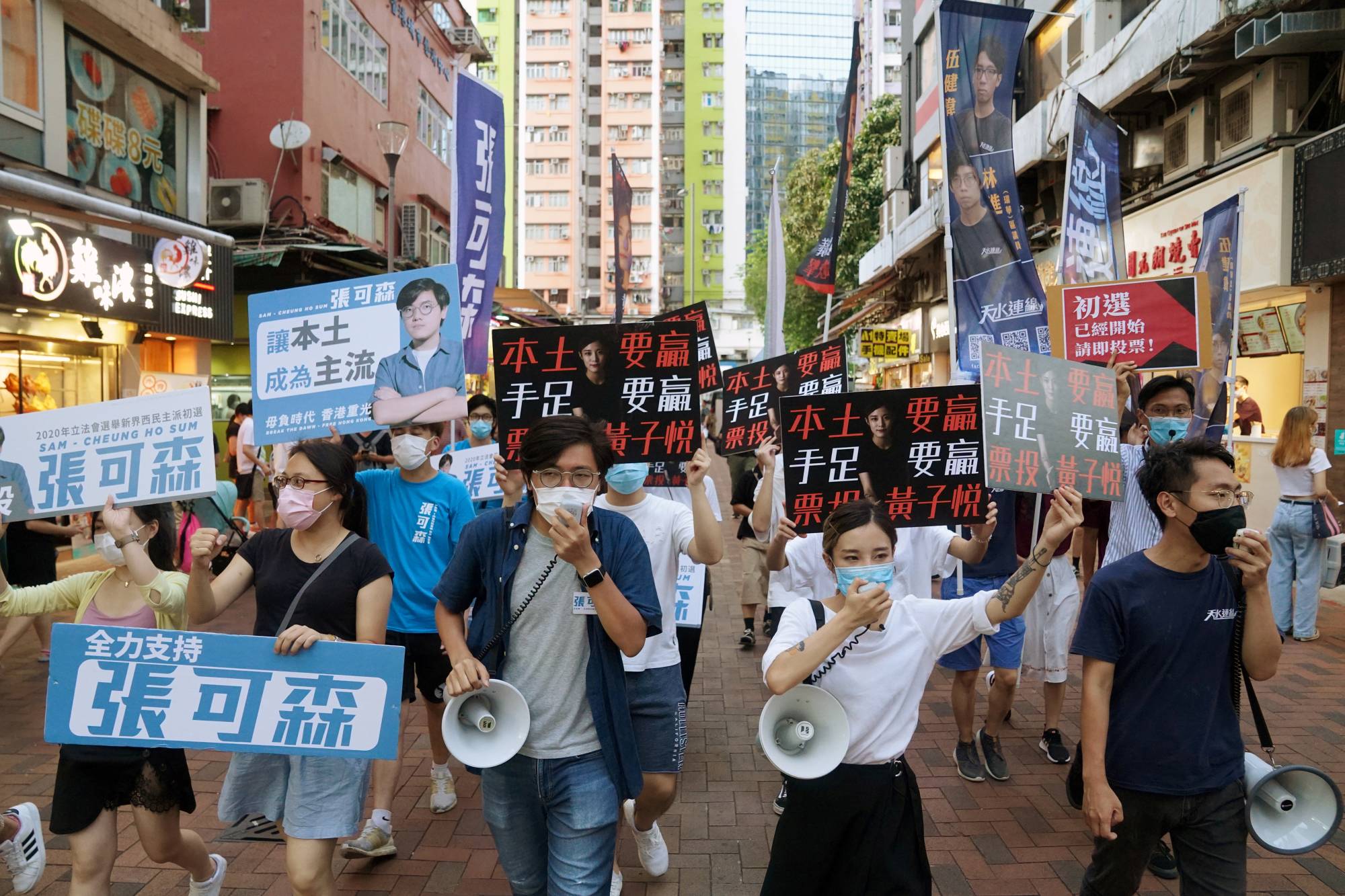Chinese attempt to snuff out democracy fails to kill the spirit of Hong Kong
With the largest pro-democracy party in Hong Kong unable to take part in the district council polls in the island city in the coming December, the process of election in the former British colony has turned into a farce under Chinese rule. After an overhaul in the electoral law, the Democratic Party will now be absent from the district council election since its establishment in 1994.
Chairperson of Democratic Party Lo Kin-hei has informed that he and other members of the party could not secure enough nominations under the new rules the authorities have introduced to ensure that patriots administer Hong Kong. Other smaller political groups from the democratic camp are in the same predicament. Under the new rules, only 20 percent of the seats in the district councils will be directly elected. Eighty percent of the seats will be filled by people appointed by the government. Besides, all candidates will need to be vetted. To enter the electoral race, a candidate will have to secure endorsements from at least nine members of local committees that are packed with pro-government figures.
All these are part of an effort to ensure only “patriots” are able to hold political office in the island territory. Previously, about 94 percent of the seats to the district council were elected. With the changes in July, 2023, the proportion of the elected seats is now lower than when the district councils were elected in 1982 under British rule.
The district councils were the last major political representative bodies chosen by the public in the former British colony, now under the rule of the oppressive communist regime in China. Elections to the district council seats typically draw little international attention as the councillors mainly handle municipal matters, such as organizing construction projects and ensuring that public facilities are in order. But the councils assumed more importance politically after the pro-democracy camp of the city won a landslide victory in the poll at the height of the protests of 2019.The protest was against legal revisions proposed by the Hong Kong authorities allowing criminal suspects to be extradited to mainland China. Millions of people had taken to the streets.
Predictably, while introducing the new district council electoral rules, Chief Executive of Hong Kong John Lee, a former police officer, said the councils elected in 2019 during the height of the pro-democracy protests were “platforms of protest violence and Hong Kong independence. Many council members refused to pledge their allegiance. They refused to recognize the People’s Republic of China as Hong Kong’s sovereign state.” Kenneth Chan, an expert in politics at Hong Kong Baptist University, has commented that the change “confirms the perception that a pathway towards democracy has ended for good. It looks like the district councillors would just be the echo chambers serving mostly the administration rather than channelling bottom-up views and expectations from the community level.”
The former British colony of Hong Kong returned to Chinese rule in 1997 and was promised it could keep its Western-standard civil liberties intact for 50 years after the handover. But the communist rulers in Beijing started interfering with these civil liberties soon after gaining control of the administration of the island city. After the protests of 2019, a draconian National Security Law has been introduced that has undermined the openness and freedoms that were once the hallmarks of the city. In 2021, Beijing overhauled the election process for the Legislative Council, the legislature of Hong Kong, so that only the candidates who would pass the “patriots only” vetting process of the authorities were allowed to run for the elections.
The lure of the only island of democracy in autocratic China, however, refuses to fade away despite the crackdown imposed by the communist rulers in Beijing since 2019. The freedom loving common people of China are still migrating to Hong Kong from the mainland. According to an AP report from Hong Kong on November 1, 2023, the exodus of tens of thousands of professionals from Hong Kong to Western countries, triggered by a crackdown on civil liberties, is being offset by new arrivals. Between 2019 and mid-2022, the population of Hong Kong declined from 7.5 million to 7.3 million. International companies and banks moved their headquarters away. Nearly 124,000 residents of Hong Kong have since moved to the U.K. and many others have gained permanent residency in Canada. The Hong Kong authorities have been forced to introduce a ‘Talent Scheme’ to plug the brain drain. Passing a test under the scheme, professionals can secure a job in Hong Kong.
Though the new arrivals may fill up the gaps left by the brain drain in some areas like finance, professionals from mainland China may not fully make up for the loss of talent across various sectors, says Honorary Fellow at the Chinese University of Hong Kong. The medical sector, for instance, has lost some experienced professionals who cannot be easily replaced by doctors trained in mainland China.
For the freedom loving common people of China, the attraction of the former British colony still remains. Despite the crackdown, certain remnants of the democratic traditions of bygone days still prevail in Hong Kong: wider freedom of speech than in the mainland, better internet access, the cosmopolitan ambience, a less oppressive work culture and a society where ability still prevails over connections with party bosses. This is the view of about 20 Chinese visa holders in Hong Kong who the AP has interviewed.
Wu, a financial professional in his late 20s, has told the AP that in his view moving to Hong Kong has been a way to gain greater freedom and security. Afraid that he would be victimized by the vindictive authorities, he had asked the AP to be identified only by his surname but told the AP that he was in a state of panic when he had been trapped in Beijing during the draconian lockdown in the period of the pandemic. He had been tempted to join a protest against the stringent lockdown restrictions introduced by the Chinese authorities but preferred instead to “run,” a euphemism used frequently in China to convey that one was emigrating. It was a commonly used term in China in the days of the pandemic. For him, Hong Kong is now, like a “life boat,” which will help him to sail to distant shores which are safe and secure.
Wu says he shares with most residents of Hong Kong a desire for freedom of speech. He is also happy that Hong Kong has fewer staunch nationalists, dubbed jocularly “little pinks,” than in Beijing. He also cherishes in Hong Kong the ability to freely move his money to other countries and to be able to access the internet without having to use VPNs that the residents of the Chinese mainland have to use to circumvent the censorship that prevails there.
The right for public dissent has been throttled in China under the rule of the Xi Jinping government. Space for public dissent has shrunk considerably in the island of Hong Kong, too, since 2020 with the crackdown that has followed since the imposition of the National Security Law. But the lure of Hong Kong remains with the oppressed people of mainland China because some remnants of Western-style civil liberties are still left in Hong Kong, a legacy of its history as a former colony.
People from mainland China who had moved in have become permanent residents of Hong Kong after staying in the city for more than seven years. Nearly a third of the residents of Hong Kong had been born in other parts of China and in Taiwan. They had moved in years ago. Zhang Guangwei, a 22-year-old fresh graduate has been quoted that he had turned down several job offers in mainland China to work as a software developer in Hong Kong. He had wanted to escape from the notorious “996” work culture in mainland China, under which employees often worked from 9 a.m. to 9 p.m., six days a week. He had got a taste of such rampant exploitation of workers when he had done a period of internship in mainland China. Now he is happy his job in Hong Kong requires him to work only from 9 a.m. to 6 p.m. for five days a week. That allows him spare time to hike and socialize with friends. “If work gets too busy, I feel it’s meaningless for me to earn money,” he has been quoted in the AP report.
Mid-career people have been attracted to Hong Kong, motivated by the wider opportunities for education available for their children in the island city. Monica Wang, a 39-year-old lady in business had been enticed by the freedom of speech prevailing in the former British colony, and its portrayals in movies and TV shows as a modern city that embraced a variety of lifestyles. She wanted to see more about the world and also that her children could do the same. With the imposition of the National Security Law in Hong Kong following the pro-democracy movement in 2019, many of the leading democratic activists of the city have been prosecuted, civil liberties groups have been disbanded and pro-democracy media like Apple Daily and Stand News have been forced to shut down. Now if the government tightens controls further and the political atmosphere in Hong Kong becomes too suffocating, many of the professionals who have migrated to the island city may wait for seven years to get permanent residency and then leave for greener pastures in Western countries.












